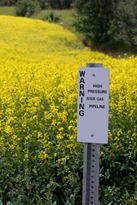Lack of Waste Water Treatment Facilities Holds Up NY’s Plunge into Hydrofracturing
by Edith Honan, REUTERS, February 20, 2010
 Technological advances that have unlocked natural gas from shale rock deep beneath the surface have outpaced advances in water waste disposal, meaning that gas drilling could begin in New York state before a waste disposal program is in place.
Technological advances that have unlocked natural gas from shale rock deep beneath the surface have outpaced advances in water waste disposal, meaning that gas drilling could begin in New York state before a waste disposal program is in place.
“There is a shortage of treatment facilities that can handle this very salty water, so that’s going to become a bit of a bottleneck for the industry when they do start issuing drilling permits,” said hydrogeologist John Conrad, head of the environmental consulting firm Conrad Geoscience Corp.
The booming shale gas business accounts for 15 to 20 percent of U.S. natural gas production and is seen increasing fourfold over the next 15 years, providing a relatively clean energy source for a country sensitive to its dependence on foreign oil and looking for ways to reduce carbon emissions.
But millions of gallons of water are needed for each shale gas well, leaving drillers to deal with the tainted waste water. Some companies such as Chesapeake Energy (CHK.N) have employed a “closed-loop” system that reuses water, which experts and environmental critics see as part of the solution.
New York state, which sits on top part of the gas-rich Marcellus Shale, has placed a virtual moratorium on high-volume drilling while it completes an environmental review.
Meanwhile, the U.S. House of Representatives Energy and Commerce Committee is investigating the environmental and public health impact of the drilling technique known as hydraulic fracturing, and the Environmental Protection Agency said it would start working with Congress to study the matter.
In hydraulic fracturing, millions of gallons of water are mixed with sand and diluted chemicals and blasted into shale rock at a pressure high enough to break the rock and free the trapped methane gas.
Environmentalists and people living near drilling operations worry that the drilling process might contaminate ground water, even when heavily diluted. They have also raised concerns about benzene, arsenic and low-level radioactive matter coming up from the shale. [Read rest of story]


